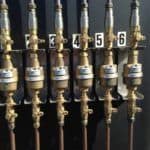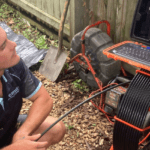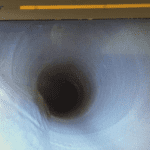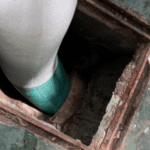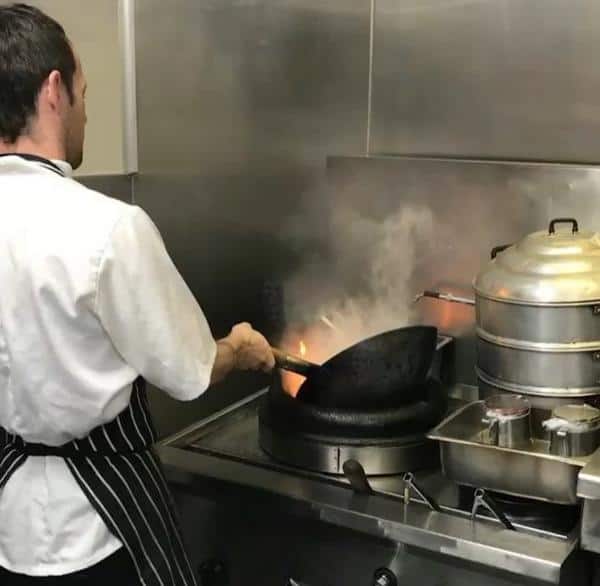
We all know that it gets hot in a kitchen – but in a commercial kitchen it gets hotter than a residential kitchen could ever imagine! With multiple burners going at the maximum temperature constantly, ovens always on, deep fryers and wood burning pizza ovens, your chefs aren’t going to be the only ones breaking a sweat!
Your commercial kitchen needs to be built to a certain level safety standards to ensure that your kitchen is safe for you, your staff and patrons too.
When you’re fitting out your commercial kitchen (or renovating it), business owners are thinking about the best appliances to maximise efficiency, however safety needs to come first – always.
What is Most Likely to Cause a Commercial Kitchen Fire?
In a commercial kitchen, the culprit for fires is often grease. Your kitchen has lots of appliances, grease and heat – one small fire can get out of hand fast. The worst part of a grease fire is that it can’t be put out with water. Dousing with water may be your first reaction, but water will just spread grease flames causing more damage and possible injury or worse.
TYou need to provide proper training to your kitchen staff on how to deal with and identify different types of fires. But you also need to provide them the right tools.
What You Need to Prevent & Put Out Commercial Fires
When it comes to setting up your business for fire protection, as a business owner, it’s your responsibility to ensure that you know your fire risk. And we’ve found in our time that while fire safety is initially installed and set up to correspond with legal standards, it’s often quickly forgotten about.
Do you know the answers to the following fire safety questions?
- Where is your evacuation plan displayed? And when was the last time you had a fire drill?
- Do you have an emergency plan?
- When were your fire extinguishers purchased? And where are they?
- When was the last time you tested your fire alarms?
Scroll to the bottom of this article to learn what your answers should be!
Prevent Commercial Kitchen Fires With the Right Fire Protection System
When you’re setting up a commercial kitchen, you need a fire protection system that works to keep your business and staff safe. The best thing that you can do for your commercial kitchen is to install a wet chemical system like an Ansul Cabinet, and not a water mist system – which can just exacerbate certain types of fires (such as grease!) in your kitchen.
A wet (non-toxic) chemical agent not only puts fires out, but the chemical reaction with the flames will cause the agent to smother, and prevent the flames from reigniting. It’s a fast and reliable system that is safe to use around food.
At Emu Plumbing, we work with Flame Control Industries, a Brisbane-based company that installs and maintains fire suppression equipment to keep your staff and business safe. They know the right types of suppression to use, where to place the systems and what you’ll need for the size of your business. These systems are installed with automatic gas isolation valves to eliminate the risk of further inflammation in case of emergency. Emu Plumbing provides the gasfitting design, supplies & connections as required, customised to suit your application.
Prevention is better than cure – so you need a team of experts to recommend and install the very best quality fire protection system for your business to stop any fire before it can even start.
Is Your Commercial Kitchen Protected From fire?
- Fire drills should be practiced annually to ensure that all staff are aware of evacuation plans and meeting points. The evacuation map must be prominently displayed in an area all staff can access.
- Under section 43 of the Workplace Health & Safety Regulations, an employer must prepare and maintain an emergency plan which includes:
- Evacuation procedures Notification of emergency services
- Medical treatment
- Effective communications
- Testing of emergency procedures
- Information, training and instruction to workers in relation to implementing the emergency procedures
Along with an emergency plan, you’ll need to assign roles and responsibilities to your staff so that everyone knows what they need to do in case of fire. From head counts, to calling the fire department and communicating with patrons, when everyone knows their role, there’s a far lower risk that anyone will be injured.
- Your fire extinguishers must be clearly marked as to which class of fire they extinguish – and your staff needs to know this too. They should be located by the entry to the kitchen, not inside. This is to ensure that those going to use the extinguisher are always walking away from the fire and don’t need to go past or through it.
- Smoke alarms must be tested at least every 12 months. You can hire a smoke alarm servicing company to regularly test your alarms, replace batteries and book you in for the next service so you don’t have to worry about it.

